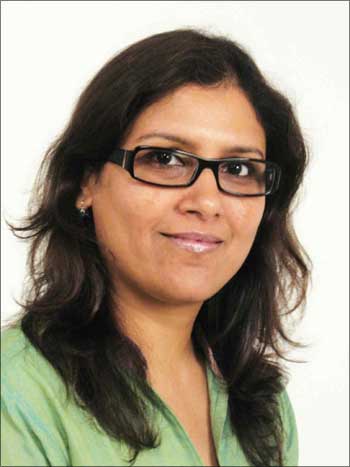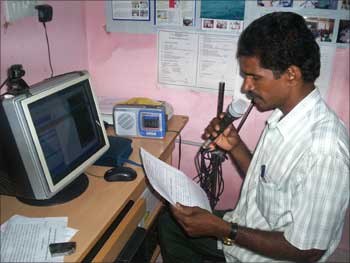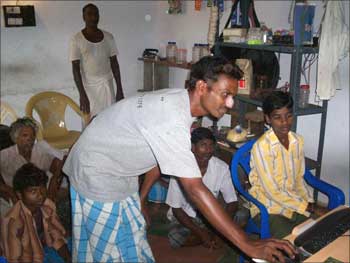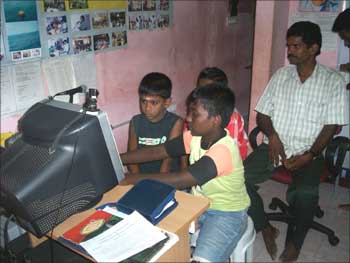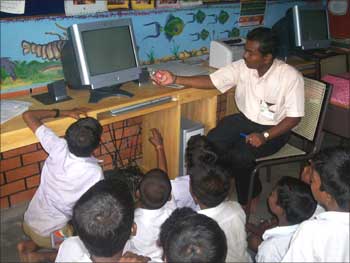 | « Back to article | Print this article |
The other side of Nasscom
It was with the idea to give something back to the society that Nasscom (the premier trade body and the chamber of commerce for the IT-ITeS sector in India) started a foundation four years ago.
Though some of the members of the National Association of Software and Services Company were engaged in some social service, Nasscom felt the need to create a bigger umbrella and involve all the members, said Rufina Fernandes, chief executive officer, Nasscom Foundation.
"We have 1,200 companies which employ over two million people as our members but those who are actively involved in CSR (Corporate Social Responsibility) activities may be only 100. The rest may be doing some work but at a small level.
"It was to bring all members under one umbrella that the Nasscom Foundation was formed. Our focus is social development. In fact, we welcome even non-members to join the Foundation to work for a social cause."
The other side of Nasscom
Nasscom Knowledge Network was one of the first programmes started by Nasscom. It is a network of 260 tele-centres or knowledge centres across 13 states and 80 districts of India.
"We partner with NGOs, self-help groups, social entrepreneurs and other community based organisations. Each centre has a minimum of 2-5 computers, master trainers and connectivity. There we train people who in turn train those who are at the bottom of the pyramid and the under-served communities," Fernandes said.
Tamil Nadu has the largest concentration of 62 centres that work with 75 non-government organisations and the centres train people on IT skills. This programme has trained over 60,000 people.
The other side of Nasscom
The Adult Literacy Programme is aimed at uneducated people like school dropouts, agricultural worker, fisherman, and others. It is a 45-day literacy programme in which they are taught to read and write.
In the villages, Nasscom Foundation also has health information services on pre-natal and post-natal care, nutrition and on HIV and AIDS.
The other side of Nasscom
BiG Tech launched in August 2007 is an online programme for NGOs to bridge the digital divide. NGOs can register and apply for a donation. The NGOs then receive software and hardware at subsidised rates. Big Tech makes technology assistance accessible to any NGO in India with just a click. It has three donors on board - Microsoft, Eagle and Bytes of Learning.
"The BiG Tech portal (www.bigtech.in) is a convenient and transparent portal that enables Indian as well as foreign technology companies to reach out to the million plus NGO community in India. Technology companies can use the BiG Tech portal as a part of their CSR objective by donating hardware and software. Microsoft was the first donor on this platform for India and several others are coming in. Nasscom Foundation delivers our programmes in India in partnership with TechSoup, a US-based organisation," Fernandes said.
There are over 300 registered NGOs and 85 NGOs from 22 states have benefited, with software worth Rs 4 crore (Rs 40 million) donated so far. "As it is an online programme, NGOs from North-East to Jammu and Kashmir have benefited from this program," informed Fernandes.
The other side of Nasscom
When Nasscom Foundation found that 93 per cent of their members are engaged in some voluntary work or the other, but it is not getting documented, the voluntary portal (www.mykartavya.com) was launched. A contest was held to select the name.
Fernandes explained, "While knowledge centres have physical connection with the community, this is a virtual platform. Mykartavya is for voluntary work and is open to our members only at the moment. When a member company comes on board, we allow the employees of that company to do voluntary work. And once an employee volunteers to do some work with an NGO, it is documented.
"The NGOs when in need of volunteers can make the requests on mykartavya. Voluntary work becomes more structured with this platform. Monitoring voluntary work is as important as doing work. A country like ours needs many, many mykartavyas actually."
